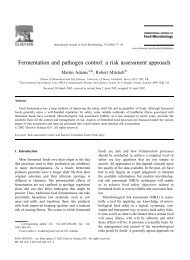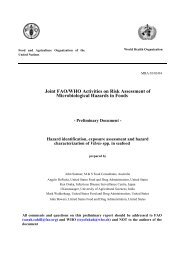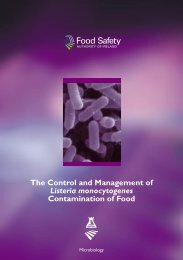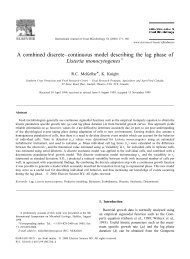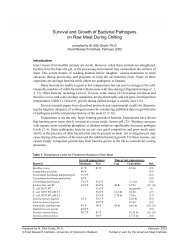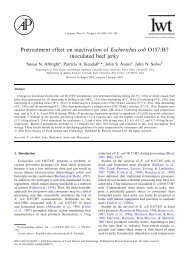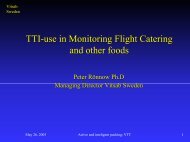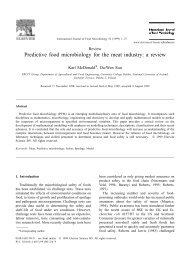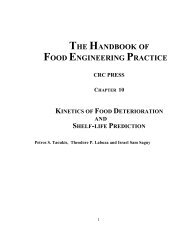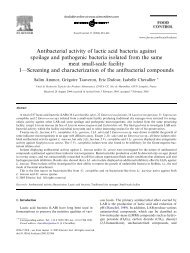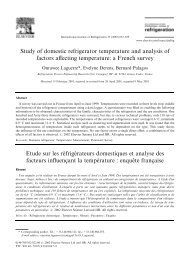Download
Download
Download
You also want an ePaper? Increase the reach of your titles
YUMPU automatically turns print PDFs into web optimized ePapers that Google loves.
History and future of TTI & RFID<br />
Traceability, Safety and Shelf Life<br />
Dr. Ted Labuza<br />
tplabuza@umn.edu<br />
Industrials<br />
Paint<br />
Adhesives<br />
Solder<br />
Paste<br />
Blood, Vaccine, Pharma,<br />
DoD Meals Ready to Eat,<br />
Film<br />
Fish, Deli, Coffee, Wine, Dairy, Cut Salad,<br />
Organics
What do we want to do now and in the future<br />
(Traceability) ?<br />
• Get the location of a lot of food in the<br />
distribution chain in case of an event (recall or<br />
bioterror event) ?<br />
• Where did ingredients come from?<br />
• What about the ingredients in ingredients?<br />
• What line, batch #, date, time was it made on?<br />
• What is the shelf life left of the product?<br />
• Is the food safe when we eat it, either by sensing<br />
agents or by modeling?<br />
ISO 9000-2000 Clause 3.5.4 Traceability is the ability to<br />
trace the history or location of what is under consideration
Passive -Information only<br />
food labels<br />
• Kroger 1960’s - starts putting “sell by “ on<br />
milk<br />
• Denmark 1970’s required<br />
– Pack date<br />
– Sell by date<br />
– Use by date<br />
• GMA v Mass. Dept. Public Health -<br />
– 393 NE2nd 881 (1981)<br />
– Court agrees state can require dating
U.S. Regulatory Stance on<br />
Shelf Life<br />
• Federal Laws<br />
– Required for drugs, OTC and infant formula<br />
– Drugs 10% loss below label value on lower 95% CL line<br />
– All other food products voluntary - no mention in<br />
regs<br />
• State laws<br />
– 30 states regulate some dates (dairy, meat)<br />
– Minnesota ≤ 90 days<br />
– None based on safety more for commerce
ypes of food dating<br />
Code date<br />
Born on date<br />
Sell by date<br />
Better if used by<br />
Freeze by<br />
Best when purchased by<br />
Best if used by - minimum durability<br />
Death date - use by (expiration)
EU Dating Rules<br />
Directive 97/4/EEC Article 9 of 79/112/EEC.<br />
1. The date of minimum durability of a foodstuff shall be<br />
the date until which the foodstuff retains its specific<br />
properties when properly stored. It shall be indicated in<br />
accordance with the provisions of this article.<br />
2. The date shall be preceded by the words:<br />
--“Best before…” when the date includes an indication of the<br />
day,<br />
--“Best before end…” in other cases<br />
3, In the case of foodstuffs which, from the microbiological<br />
point of view, are highly perishable and are therefore likely<br />
after a short period to constitute an immediate danger to<br />
human health, the date of minimum durability shall be<br />
replaced by the “use by” date.
But: dates by themselves ignore<br />
t-T history in distribution<br />
So
Development of TTI<br />
• 1977 WHO issues report on need to improve<br />
cold chain because of vaccine distribution<br />
problem in LDCs (84% ineffective<br />
• Wendel Manske @ 3M<br />
– Monitor-Mark Diffusion tag<br />
– US patent 3,954,011 5/76 3M<br />
• K. Blixt -Swedish patent for i-Point device<br />
• Byrne (General Foods ) & Kramer (UMD) 1977<br />
– presented correlation study of tags vs food<br />
change for frozen foods<br />
– Used i-Point and 3M Monitor Mark<br />
missed the key kinetic point
Shelf Life Dating<br />
• OTA Study on Open Shelf Life Dating of<br />
Foods 1979-81<br />
– Open dating is state driven (~30 in 2002)<br />
– No federal requirements on food but required on<br />
drugs, OTC and infant formula<br />
– Open shelf life dating of foods is desirable<br />
– Open date compromised if temperature abused<br />
– Federal Govt should support TTI research
OTA Study 1978<br />
• 96% consumers concerned<br />
with quality<br />
• 1 in 10 felt some food they<br />
bought was spoiled<br />
• most were aware of dairy food<br />
dating<br />
• 62% sorted for freshest (date)
NSF Food Loss Survey 1979<br />
• frozen foods 1 to 2.9% loss<br />
• dairy products 0.7 to 3.5%<br />
• fresh beef ~ 5% loss<br />
• fresh produce 9 to 16.6% loss
A.C. Nielson 1983<br />
• 58% of consumers found defective<br />
food when they got it home<br />
• 5% complained to store<br />
(1 in 20)<br />
• 30% did not re-buy brand<br />
• 15% did not re-buy food type<br />
• worst was fresh and frozen food
The 3 Company Trio<br />
• 3M wax diffusion tag<br />
• Vitsab (I-Point) - enzyme reaction tag<br />
• Lifelines -- Pt polymerization<br />
• 3M WLLF diffusion tag
The kinetic break-throughs<br />
• Singh & Wells 1988 (U.C. Davis) - correlation<br />
studies for DOD<br />
• Taoukis & Company at Univ Minnesota 1989<br />
– 1st quantitative work on TTI-tag kinetics<br />
– Shows need for kinetics based on E a or Q 10<br />
– Need for run out time of food<br />
– Concept that change at time to end must be same for<br />
constant or variable temp
Chemical Tag Design parameters<br />
• TTI - time-temperature integrating tag<br />
– Chemistry of reaction in tag must follow food<br />
or drug kinetics<br />
– Rate of degradation as f(T)<br />
• Arrhenius function<br />
• Similar E a or Q 10<br />
k = k o<br />
e<br />
−E a<br />
RT<br />
lnk = ln k o<br />
− E a<br />
RT<br />
or lnτ = τ r<br />
− bT
Sensory Shelf Life of Specialty Skim Milk<br />
500<br />
200<br />
100<br />
Hours<br />
50<br />
10<br />
2x10 2<br />
CFU/mL<br />
3x10 2<br />
CFU/mL<br />
Q 10 ~ 5<br />
2x10 4<br />
CFU/mL<br />
4x10 7<br />
CFU/mL<br />
8x10 4<br />
CFU/mL<br />
0 2 4 6 8 10 12 14<br />
Temperature °C<br />
MN-SD Dairy Research Center
3M Diffusion Tag<br />
http://www.fdcpackaging.com/temperature/time_indicators.html
Diffusion Kinetics for 3M tag<br />
X<br />
2500<br />
2000<br />
2<br />
1500<br />
1000<br />
3M Monitor Mark<br />
30°C<br />
20°C<br />
10°C<br />
4°C<br />
500<br />
0<br />
0<br />
50<br />
100<br />
150<br />
200<br />
250<br />
300<br />
TIME(hours)<br />
Crank derivation x 2 = k t
3M MonitorMark<br />
100<br />
ARRHENIUS PLOT TTI I<br />
ln k = k o<br />
e − E a<br />
RT<br />
10<br />
1<br />
3.2<br />
3.3<br />
3.4<br />
3.5<br />
3<br />
1/Tx10 (K )-1<br />
E a ~ 5 to 9 Kcal/mole vs food at 12 to 40 Kcal/mole<br />
3.6<br />
3.7
Shelf Life plots food or drug vs tag<br />
3 M Vaccine tag<br />
Log time<br />
TTI<br />
shelf life<br />
shelf life<br />
TTI<br />
Temperature<br />
Temperature<br />
Log time<br />
TTI<br />
shelf life<br />
shelf life<br />
TTI<br />
Temperature<br />
Temperature<br />
Illustration of proper and improper TTI design
US Patent 5,667,303<br />
• Time-Temperature Integrating Indicating<br />
Device Arens et al. 3M<br />
• Issued in September 1997<br />
• New concept of a diffusion tag with<br />
variable E a based on WLF kinetics<br />
• Range 15 Kcal to 30 Kcal/mole<br />
diffusant<br />
matrix<br />
pattern
Full scale change
3M Commercial Tests of 2nd Gen Monitor-Mark<br />
CUB Foods<br />
Johnsonville Brats
Lifelines acetylenic monomer tag<br />
polymerization catalyzed by Pt<br />
Activation Energy ~ 19 - 30 Kcal/mole
MonoPrix France 180 stores<br />
Freshness Chip
Freshness Point
Vaccine Vial Monitor (VVM)<br />
• WHO mandated programs for health care and food<br />
safety.<br />
– Vaccine Vial Monitors mandated by World<br />
Health Organization and UNICEF<br />
– ISO 9001.2000 and HACCP<br />
• Sold > 120 million “Heatmarker” labels for polio<br />
VVM (100% of WHO requirement)<br />
• http://www.fsci.umn.edu/Ted_Labuza/PDF_files/papers/Vac<br />
cine_TTIuse.pdf
VITSAB enzyme reaction tag<br />
Activation Energy ~ 20- 35 Kcal/mole<br />
Many uses and part of<br />
SMAS
Days of Shelf life of milk<br />
System Predicted actual<br />
Lifelines 9.8 10.3<br />
3M 10 9.5<br />
VITSAB 10.6 9.8<br />
Sensory 8.1 9.9
TTI Problems<br />
• need to collect food E a data<br />
• Must match tag kinetics to activation<br />
energy and run-out time of food - time<br />
consuming<br />
• ease of reading end point<br />
• sorting<br />
• Food (or tag) must not have history effect
20 °C<br />
Log N<br />
C<br />
4 °C<br />
A<br />
B<br />
D<br />
Time
TTI Problems<br />
• ease of reading<br />
• need to collect food E a data<br />
• need to match tag kinetics to<br />
activation energy and run-out time<br />
of food<br />
• food must not have history effect<br />
• marketer’s resistance to cost<br />
• liability for implied safety
Consumer demand for<br />
dating<br />
• 1998 Joanne Gage (Price Chopper)<br />
*Consumers want simple and basic information<br />
* “Sell-by” and “use-by” date sought after<br />
(Dowdell, 1996; Williams, 1998
For the past several years, many U.S. supermarket chains have<br />
elected to compete for market share based primarily on<br />
pricing, leading to eroding margins, whereas, European food<br />
retailers have focused on marketing and merchandising strategies<br />
to create a point of difference. European Retailers have also built<br />
very strong Private Label product lines which command a<br />
significant share of category mix and contribute significantly to<br />
company profitability. The development of strong Private Label<br />
programs is now an important part of the business strategy of<br />
many U.S. supermarket chains. TTIs can be an integral part of<br />
that strategy and can help to differentiate a chain's Private Label<br />
program.<br />
From Lifelines FAQ<br />
13) Why have we not seen the same success with TTIs in the<br />
United States as in Europe?
Other early systems
measures area under the T vs t curve = degree days<br />
Area not = to quality lost
Area under T vs t curve
Area under T vs t curve<br />
amount = 1 x 2 2 x1 = 4<br />
amount = 1 x 2 1/10 x20 =21.4<br />
Q 10 = 2 Rate 0°C = 1 Amount = Rate 0°C x Q 10<br />
∆T/10<br />
x time
Amount of Change for Q 10 = 6<br />
• for 1 day @ 20°C<br />
– Amount = 1 x 6 20/10 x 1 = 36<br />
• for 20 days at 1°C<br />
– Amount = 1 x 6 1/10 x 20 = 23.4
Reymomsis Fish Shelf Life Data<br />
Logger Integrator 1970<br />
For fresh fish
Tropicanna Fresh OJ<br />
Food Tech June 1991 pg 119-120<br />
• 72% of consumer complaints<br />
due to temperature abuse<br />
• lack of accountability in<br />
distribution<br />
• ~37% retail storage above<br />
recommended 32-38°F<br />
• stock rotation poor
1996 USDA FSIS Transportation<br />
Technical Analysis group<br />
• current regulation of t-T is passive<br />
• logistics of handling perishable foods is vague<br />
• what are the transportation hazards?<br />
• how to apply HACCP<br />
• who is liable ?<br />
• use of time-temperature monitoring systems<br />
• use of vehicle tracking systems<br />
• new technologies for T control
61 FR 59372-82 Transportation and Storage<br />
Requirements for Potentially Hazardous<br />
Foods<br />
• Options for Regulatory Action<br />
– Set time-temperature performance<br />
standards<br />
– Require shipper record keeping<br />
– Create Mandatory HACCP-type systems<br />
– Create voluntary guideline<br />
– Combination of approaches<br />
– Do nothing
Tell the Truth Tape<br />
Newsweek 9/28/98 pg 14<br />
“Manufacturers will still remain<br />
dependant on good refrigeration and<br />
safe handling by truckers and<br />
supermarket employees. Ted Labuza,<br />
professor of food science and<br />
engineering at the U of M, has<br />
designed a special “tell the truth”<br />
tape that records a food’s “timetemperature<br />
history” and turns a<br />
darker gray when the food is spoiled.”
• FIFO vs LSFO system (Wells and Singh<br />
1988)<br />
– Would make for better distribution using<br />
least shelf life left
• FIFO vs LSFO system Taoukis et al<br />
– ≥15% savings (EU programs including SMAS)<br />
– Taoukis, P.S., Bili M., Giannakourou M. (1998). “Application of shelf life<br />
modelling of chilled salad products to a TTI based distribution and stock<br />
rotation system.“ Proceedings of the International Symposium on Applications<br />
of Modelling as an Innovative Technology in the Agri-Food-Chain Ed. L.M.M.<br />
Tijskens, Wageningen, Netherlands, p. 131-140.<br />
– Case study with fish<br />
– Basis for formation of SMAS<br />
• http://www.vitsab.com/htdocs/default.htm
FISH SENSORY TEST<br />
ISOTHERMAL STORAGE<br />
3<br />
Sensory evaluation- Air packed seabream<br />
2,5<br />
Mean score<br />
2<br />
1,5<br />
1<br />
0,5<br />
0<br />
0,00 50,00 100,00 150,00<br />
Time (hr)<br />
200,00<br />
Giltheaded Seabream (Sparus Aurata) shelf life kinetics
TEMPERATURE DEPENDENCE OF FISH SHELF LIFE<br />
5,5<br />
Shelf life Arrhenius plot of Sparus aurata<br />
5<br />
4,5<br />
lnsl<br />
4<br />
3,5<br />
3<br />
2,5<br />
y = -8877,9x + 5,0216<br />
R 2 = 0,9906<br />
2<br />
0,000000 0,000050 0,000100 0,000150 0,000200<br />
1/Tref-1/T<br />
SL 0° (hr)<br />
E a<br />
(kcal/mol R 2<br />
170-20017.8 0.99<br />
Giltheaded Seabream (Sparus Aurata) - Arrhenius plot
FISH SENSORY TEST : NON -ISOTHERMAL<br />
STORAGE<br />
3<br />
25<br />
2,5<br />
Temperature (°C)<br />
20<br />
15<br />
10<br />
5<br />
0<br />
-5<br />
0 25 50 75 100 125<br />
tim e (h )<br />
In t.<br />
Ex .R<br />
Mean Score<br />
2<br />
1,5<br />
1<br />
0,5<br />
0<br />
0 20 40 60 80 100<br />
Time (hr)<br />
AIR PACKED<br />
50 % CO2<br />
VARIABLE TEMPERATURE VALIDATION<br />
T 1 = 0° C, 5h - T 2 =8° C, 3h - T 3 =15° C,2h ⇒ Teff=6.55° C<br />
Air packed: Experimental shelf life= 69 h<br />
Predicted shelf life= 71 h (68-74)<br />
Sparus aurata shelf life kinetics-<br />
Application in dynamic conditions shows no history effect
1<br />
Chios island<br />
2<br />
Piraeus<br />
port<br />
Measurement of TTI on top of boxes<br />
Measurement of TTI inside the boxes<br />
(101 h)<br />
(120 h)<br />
6<br />
Retail outlet<br />
and<br />
Local<br />
consumers<br />
(27 h)<br />
3<br />
4<br />
5<br />
Patra<br />
port (33 h)<br />
Distribution<br />
center<br />
(48 h)<br />
(59 h)<br />
(68 h)<br />
Italy<br />
External TTI<br />
expiration<br />
(78 h)<br />
Field Test : Monitoring seabream exported from Greece to Italy
% Life Consumed<br />
TTI Center Box<br />
TTI Top Box<br />
Time (h) out Inside<br />
box<br />
48<br />
Center<br />
of box<br />
out<br />
Inside<br />
box<br />
Center<br />
of box<br />
60% 40% 20% 70% 45% 25%<br />
78<br />
120<br />
85% 50% 25% >100% 75% 40%<br />
>100% 90% 45% >100% >100% 60%<br />
Field Test : Monitoring seabream exported from Greece to Italy<br />
Note test showed if use LSFO increase profit by 15%
Ship based on least shelf life left (LSFO)<br />
JFS 68(1):201-9<br />
J Food Protection 64(7): 1051-57
Reduction in illness using LSFO<br />
0.50<br />
Probability<br />
0.40<br />
0.30<br />
0.20<br />
0.10<br />
FIFO<br />
SMAS<br />
0.00<br />
-0.10<br />
-16 -14 -12 -10 -8 -6 -4 -2 0<br />
Log probability of illness
Commercial Application Problems<br />
• Don’t want to know about problem<br />
• Liability if tied to safety<br />
• Marketer’s resistance to cost<br />
• BUT!!!! Tracing with time-temperature<br />
logging is insurance policy and gets “who<br />
did it”<br />
So portable active “data loggers” critical
Other chemical TTI vendors<br />
• Bioett - Sweden - biosensor system<br />
• Food Guardian (UK)<br />
• Deltatrak (US) - diffusion tag
Generation III<br />
• Electronic data loggers tied to<br />
computer analysis
Data loggers<br />
• Reusable<br />
• $10-$15 cost<br />
• Designed for distribution system
Sensitech Logistics and<br />
Temperature Management<br />
http://www.sensitech.com/h_index.html
Time temperature History<br />
8<br />
7<br />
6<br />
5<br />
4<br />
3<br />
2<br />
1<br />
0<br />
0 100 200 300 400 500 600<br />
time
Alien Technology<br />
• 915 MHz RFID tag read @ 15 meters<br />
• User defined time intervals - 1000<br />
values<br />
• Introduction soon for perishable<br />
foods<br />
• No integration but data logging of t/T<br />
• Reusable with 5 year life<br />
• http://www.alientechnology.com/
iButton<br />
• Thermistor (-40 °C to +80°C) in ∆ 0.5 C<br />
• Clock/calendar (seconds up to years) @ ± 1<br />
min/month<br />
• Thermal history logger ~ 1 million points<br />
• Extra memory for manifest<br />
• http://www.ibutton.com/ibuttons/index.html<br />
• Cost $2 to $53
Freshloc<br />
t/T and t/%RH logging<br />
http://www.freshloc.com/
Many other companies<br />
• 3M Chile<br />
• Clinesense US<br />
• Sysco - US<br />
• Ceebron - Australia
Logistics management and Profitability ECR<br />
Hughes GeoStar<br />
GPS Satellite delivery control
Other driving forces<br />
• Traceability - safety<br />
– Bioterror<br />
– Product recalls<br />
– Allergens<br />
– Expiration date based on safety<br />
• Traceability - label truth<br />
– GMO identity<br />
– Country of origin<br />
• Economics
Terrorism-> Bioterrorism<br />
September 11, 2001
Bioterror<br />
• Intentional delivery of<br />
adulterant<br />
• Early identification and<br />
traceability key to stopping<br />
before major damage<br />
• Agriculture 1/6 of GDP 24<br />
MM people<br />
– If 10% hit lose $9.6<br />
billion/month<br />
US News and World Report 12/24/01<br />
http://www.fda.gov/oc/bioterrorism/titleIII.html
Biosecurity Act 2002
Regs under Biosecurity Act<br />
• Registration of all processing and holding<br />
• Notice of Import within 24 hours of entry<br />
• Detention authority (30 days) if suspect<br />
• Record keeping - ASAP but within 24 hour identity of<br />
one step forward and backward for all foods<br />
including transport vehicles See Q&A<br />
• http://www.cfsan.fda.gov/~dms/recguid.html#sec-f<br />
• Final rule<br />
http://www.cfsan.fda.gov/~lrd/fr04d09a.html#IIIe4
Food Process Distribution<br />
Chain<br />
FARM &<br />
Feed<br />
Ingredient<br />
supplier<br />
Rail or<br />
truck<br />
Distribution<br />
System eg<br />
silos<br />
Process<br />
supermarket<br />
Distribution<br />
Center
5 day Lettuce orders<br />
Goes to > 1000 stores<br />
~ 1 million heads<br />
Co-mingling at supermarket DC
The Fresh Milk System
EU Requirement<br />
178/2002 Article 18 Traceability 1/1/05<br />
All stagesproduction,<br />
processing &<br />
distribution<br />
Food, animals,<br />
ingredients and<br />
feed<br />
Info available on<br />
demand<br />
Forward and<br />
backward
Key Questions<br />
• What is in the food, ie can we trace all<br />
ingredients?<br />
• Where is it at and how much at any point in time ?<br />
– Chain traceability - ie location info rather than ingredient<br />
info<br />
• When will the product reach consumers?<br />
– Distribution (supply chain) and sales logistics<br />
• How soon can/will the government react if they<br />
need to, ie data collection, transfer and<br />
management systems?<br />
– Data is food movement and public health reports
Drivers<br />
• Recalls<br />
– Majority are meat and allergens<br />
In April 2002 FDA<br />
began classifying<br />
most allergens as<br />
Class 1 recalls
Meat traceability<br />
• August 2002 19.8 MM lb hamburger recall<br />
– 30 ill with E coli O157:H7<br />
– 1 death<br />
– Only 8000 lbs back<br />
– Had a 3.5% rework policy
Days<br />
Time to Event<br />
99% stopped 1st symptoms<br />
To Supermarket or broker<br />
Visit doctor<br />
CDC-FDA Acts<br />
# or<br />
symptoms<br />
To DC<br />
To Home<br />
Hospitalization<br />
0 1 2 3 4 5 10 12 15 2 0
Drivers GMO
EU labeling initiative 2003<br />
• EU will accept US GMO if labeled with complete<br />
traceability to farm<br />
• Label if ≥ 0.1% content<br />
• US claims a trade barrier and files in WTO court<br />
• US rep says “traceability not worthwhile” will<br />
lose $4 Billion in exports<br />
• EU argues but same as FDA new powers<br />
• C&E News 6/9/03 pg. 25-33
damage<br />
• In 2002 Canadian exports of beef were $4 billion<br />
• On first day (5/20/03) McDonalds lost $1.2 Billion in<br />
stock market<br />
• Canadian farm losses are $11 MM/day<br />
• Feedlot losses (1st month $400 MM)<br />
• in July $3.1 billion outstanding loans<br />
• August 2003 total loss $42 billion<br />
• Today $11 MM per week<br />
• GNP reduction ~1%
Drivers<br />
• Country of Origin Labeling (COOL) 2003
Country of Origin Labeling<br />
• Federal Security and Rural Investment Act of<br />
2002 HR 2646 2002 (Farm Bill)<br />
• COOL Sec 10816<br />
• Identity required by 2004<br />
• Retailer must ensure (indemnification)<br />
• Fine $10,000 per violation<br />
• 6/17/03 Japan asks 26 countries for beef<br />
traceability<br />
• EU 104/2000 for fish<br />
• Rest delayed until 9/30/2006
Cool Record keeping<br />
http://www.ams.usda.gov/COOL/
Food Allergen and Consumer<br />
• Title II S741<br />
Protection Act 8/3/04<br />
• Requires all allergens to be declared including hidden<br />
• Identity in common language use 8 major food categories<br />
• Report to Congress on allergen inspections and methods<br />
to reduce contact<br />
• Guidelines for restaurants and food service to prepare<br />
allergen free foods<br />
• Investigate the “may contain” label<br />
• Takes effect 1/1/2006<br />
Indicates the need for an electronic active tag<br />
system that records and forwards info to next step
Economics<br />
• Retail shrink ~ 2.3% vs 0.7% profits<br />
Damaged and spoiled goods ~ 0.5%<br />
• Employee theft (49%) ; Shoplifting (32%)<br />
• Most spoilage is refrigerated produce<br />
• U Arizona 40% food waste<br />
• ERS estimates 27% waste<br />
• Nat. Supermarket Research Group<br />
– 2002 estimate $31 billion<br />
– EU shrink ~ $25 billion
The last quart<br />
of milk you sold<br />
me was<br />
no good !!!<br />
Expiration Dating of foods<br />
& Safety<br />
Did the<br />
date expire<br />
No, but the cat I gave it to<br />
did<br />
DAIRY<br />
DAIRY<br />
Question of safety vs food quality<br />
Value of life = $6.5 MM
Consumer Open Dating<br />
Survey<br />
http://fscn.che.umn.edu/Ted_Labuza/tpl-books-main.html
Survey Part I<br />
Open dates<br />
Number of participant responses<br />
50<br />
40<br />
30<br />
20<br />
10<br />
0<br />
Q: How reliable is the open date in regards to the<br />
actual shelf-life of refrigerated foods? (n=100)<br />
0<br />
1<br />
Not reliable at<br />
all<br />
2<br />
33<br />
47<br />
18<br />
2 3 4 5<br />
Extremely<br />
reliable
Listeria monocytogenes<br />
• Major concern for RTE refrigerated foods<br />
• 354 billion servings per year in US<br />
• 2500 illnesses<br />
• 500 deaths or long term kidney damage<br />
• Bil Mar Foods - major incident 20 deaths-hotdogs<br />
– Tom Billy of FSIS implicated that those that made<br />
people ill or died were consumed at or near “use by”<br />
date and were temperature abused<br />
– Many manufacturers now set date shorter and good<br />
product discarded
Shelf Life Dating Confusion<br />
Safety vs Quality<br />
• August 1998 Prevention Magazine - NBC survey<br />
– 61% feel sell by is last date to safely sell<br />
– 34% feel use by is last date to safely use<br />
• 1999 IFT document to RCs related to safety and open date<br />
• 1999 National Enquirer<br />
– Use by date is a stern warning on meats, poultry and other<br />
perishables. Pay close attention and do not use once date is<br />
passed<br />
• Food Technology July 1999 “Playing the Open Dating<br />
Game” Ted Labuza and Lynn Szybist
USDA -FSIS 1998<br />
Guidance for Beef Grinders to Better Protect<br />
Public Health<br />
Guidance for Minimizing Impact Associated with a<br />
Food Safety Hazard in Raw Ground<br />
Meat and Other FSIS Regulated Products<br />
Install a time-temperature indicator on the package to<br />
indicate adequate temperature of storage, distribution,<br />
and display (in grocery and other retail establishments).
Journal of Food Protection, Vol. 68, No. 8, 2005, Pages 1761–<br />
1775 Supplement<br />
Considerations for Establishing Safety-Based Consume-By<br />
Date Labels for Refrigerated Ready-to-Eat Foods†<br />
ADOPTED 27 AUGUST 2004, WASHINGTON, D.C.<br />
NATIONAL ADVISORY COMMITTEE ON MICROBIOLOGICAL<br />
CRITERIA FOR FOODS<br />
NACMCF Executive Secretariat,* U.S. Department of<br />
Agriculture, Food Safety and Inspection Service, Office of<br />
Public Health Science, Room 333<br />
Aerospace Center, 1400 Independence Avenue S.W.,<br />
Washington, D.C. 20250-3700, USA<br />
MS 05-701: Received 7 February 2005/Accepted 1 March 2005
1. What are the scientific parameters for establishing safetybased<br />
‘‘use-by’’ date labels for refrigerated RTE foods?<br />
2. What effect do the multiple factors that influence the<br />
growth and survival of L. monocytogenes, i.e., strain<br />
differences, food matrices, production and distribution<br />
systems, consumer susceptibility, etc., have on the<br />
establishment of safety based ‘‘use-by’’ date labels for<br />
refrigerated RTE foods?<br />
3. What data need to be acquired to scientifically validate and<br />
verify the adequacy of a proposed safety-based ‘‘use-by’’<br />
date label for a refrigerated RTE food?
4. Should safety-based ‘‘use-by’’ date labels for refrigerated<br />
RTE foods be established using mathematical modeling<br />
techniques? If so, what modeling approaches are best suited<br />
to the development of labels for refrigerated RTE foods?<br />
5. What impact would safety-based ‘‘use-by’’ date labels<br />
created for one psychrotrophic pathogen, e.g., L.<br />
monocytogenes, likely have on the control of other<br />
foodborne pathogens in refrigerated RTE foods?<br />
Disappointment - will set based on single<br />
temperature and no mention of TTI work
CFU<br />
critical<br />
Microbial Life cycle<br />
stationary phase<br />
log N<br />
exponential phase<br />
death phase<br />
t 0<br />
Below<br />
detection<br />
lag phase<br />
CFU limit<br />
N 0<br />
t<br />
t Lag<br />
TTD time<br />
Each has a different temperature sensitivity
Listeria Shelf Life (100 CFU/g)<br />
on hotdogs<br />
100.0<br />
10.0<br />
Lag Time<br />
Time for 100 x<br />
Total time<br />
Expon. (Total time)<br />
Expon. (Time for 100 x)<br />
Expon. (Lag Time)<br />
t = 149.69e -0.1176 T<br />
R 2 = 0.9385<br />
1.0<br />
0 5 10 15 20 25 30 35 40<br />
Temperature °C<br />
Electronic tags can handle all three periods of growth
Clostridium botulinum fish study<br />
(Genigeorgis group)<br />
5 years<br />
types B, E and F<br />
4 to 30 °C<br />
60 days maximum<br />
927 experiments<br />
18700 samples<br />
187,000 mice
Days<br />
100<br />
10<br />
1.0<br />
Days to detect botulinum toxin<br />
Baker & Genigeorgis 1990<br />
Safety Line<br />
Q 10 ~ 4<br />
E a ~ 21.3 Kcal/mole<br />
0.1<br />
0 10 20 30 40<br />
Temperature °C
Log TTD vs temperature<br />
Time to detect Listeria Monocytogenes<br />
100<br />
Hot Dog<br />
Agar<br />
Broth<br />
Expon. (Broth)<br />
Expon. (Hot Dog)<br />
Expon. (Agar)<br />
10<br />
2T 55 hr vs<br />
Actual 80 hr<br />
@ 4 C<br />
Hot Dog TTD = 132.12e -0.1081T<br />
R 2 = 0.9597 Q10 =2.95<br />
Agar TTD = 169.18e -0.0978T<br />
R 2 = 0.9334 Q10= 2.67<br />
1<br />
0 10 20 30 40<br />
Temperature C<br />
Broth TTD = 318.16e -0.1336T<br />
R 2 = 0.9716 Q10= 3.8<br />
Using 29 and 36 °C TTD @ 5 °C is 50 hr vs 72 hour
New Driving sectors Generation IV<br />
Active “RFID Labels” for t-T management<br />
• includes<br />
– Foods $4 billion<br />
– Cut flowers - potential $58 MM global<br />
– Drugs DOD study on dates<br />
– Mail order/ web drugs<br />
– Adhesives<br />
– Photographic film<br />
– Cosmetics<br />
– Explosives<br />
– Paint
Electronic “Smart Labels” for TTI<br />
• Driven by<br />
– Current TTI- No data storage to find weak link<br />
(insurance)<br />
– Electronics got smaller<br />
– Move towards electronic tags with RFID to replace bar<br />
codes with traceability<br />
– Can build in run out time and activation energy on<br />
computer chip so kinetics match is easy to do<br />
– Can create sharp end point<br />
– Electronics does not have history effect<br />
– Includes traceability at same time (RFID)<br />
– Ability to follow multiple steps with different Ea<br />
(microbes)
The kick- start of RFID<br />
• Wal-Mart<br />
– 2004 sold $1.7 billion retail out of $7.5 billion total (22%)<br />
– Required top 100 suppliers to use RFID by 1/1/05<br />
– All suppliers required by 2006<br />
– Already found that RFID helps reduce inventory<br />
requirements and out of stock situations<br />
• 2004 Retailers worldwide spent $400 MM on RFID<br />
– High costs limits RFID to retailers with >$5 billion sales<br />
• Military to switch by 2006<br />
• RFID manufacturers in 2005 release new tags at < 10 ¢<br />
(Avery Dennison and Alien)<br />
• US will adopt EU ISO standards<br />
• Frost & Sullivan predicts >$4 billion RFID sales by 2011
Achieving RFID Traceability<br />
• Tag-reader compatibility<br />
– frequency<br />
• Data standardization ePC<br />
• Traceable resource unit (TRU)<br />
– One fish vs 1 case vs 1 pallet
Shelf Life Consumed Approach to<br />
reduce memory space<br />
f con<br />
=<br />
t i — the time a product is held at some constant<br />
temp T i for a given time segment<br />
t si — the actual shelf life of the product held at that<br />
constant temp T i<br />
con j = fraction of shelf j life used up<br />
f con<br />
t @ T<br />
∑<br />
i<br />
=<br />
i =1<br />
t s<br />
@ T i<br />
t @T<br />
∑<br />
i<br />
= t 1<br />
+ t 2<br />
+ t 3<br />
+.......<br />
i =1<br />
t s<br />
@T i<br />
t s 1<br />
t s 2<br />
t s 3
Electronic TTI solutions and problems<br />
• ease of reading<br />
• need to collect food kinetics data<br />
• match TTI to activation energy of food<br />
• Food or tag must not have history<br />
effect<br />
• marketer’s resistance to cost (can be<br />
< $0.05)<br />
• liability for implied safety
KSW TempSense<br />
www.ksw-microtec.de
Micro-electronic TTI tag vendors<br />
• Technopuce (France)<br />
– Acti-Tag RFID TTI for t/T integration<br />
– Hemo-Tag TTI for blood (two technology<br />
awards)<br />
– http://www.technopuce.com/
Micro-electronic TTI tag vendors<br />
• Infratab (US) skaye@infratab.com<br />
– Micro-electronic TTI integrator<br />
• RFID capability for traceability<br />
• US Patent # 5,442,669<br />
– For food and other perishables<br />
– Prototype design stage
End points<br />
• Color change<br />
• Lights up red<br />
• Beeps<br />
• LED - don’t use<br />
• Or if listeria then blows up food
Critical Factor - Cost
Critical Factors - technology<br />
• Choice of frequency ISO standards<br />
• Data standards ePC<br />
• Water absorption of µ-wave reduces power<br />
• Reflectivity of metal<br />
• Standards for readers<br />
• Software compatibility<br />
• Data security
Use concerns<br />
• Influence of environment on tag<br />
• Recycling prohibitions if on primary package<br />
• Environmental disposal (EPA)<br />
– Heavy metals in battery<br />
– organics
Traceability concerns<br />
• 4th amendment rights of privacy<br />
• Cost of implementing RFID vs paper files<br />
• Pallets vs cases vs packages (TRU)<br />
• Tag reliability in environment<br />
• Standards for data security during<br />
collection, management and sending<br />
• KISS software<br />
• Palm compatibility
That’s all folks
Contact<br />
Dr. Theodore Labuza<br />
Department of Food Science and Nutrition<br />
University of Minnesota<br />
tplabuza@umn.edu<br />
612-624-9701 fax 651-483-3302 cell 651-307-2985<br />
http://che.faculty.umn.edu/Ted_Labuza/tpl.html
References<br />
• TTI Web Site<br />
• Current practices and regulations regarding open dating of food products L Szybist<br />
and T.P. Labuza 1999 TRFIC Working paper #1 http://trfic.umn.edu<br />
• The dating game. Szybist & Labuza Food Technology July 1999<br />
• Labuza, Fu and Taoukis<br />
– J Food Prot 55:741-750 1992<br />
• Labuza and Fu<br />
– J Ind Micro 12:309-323 1993<br />
• Predictive Microbiology<br />
– McMeekan et al Research Studies Press UK 1993<br />
• Food Technology<br />
– October 1991 and April 1997 81-99<br />
• McMeekan and Ross<br />
– J Food Prot 1996 Supp 37-42



